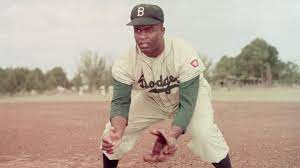In 1947, Jackie Robinson made history by becoming the first African American player to break the color barrier in Major League Baseball, forever changing the landscape of professional sports in the United States. Robinson's entry into the major leagues marked a significant milestone in the fight for racial equality and civil rights, challenging long-standing segregation practices and paving the way for future generations of African American athletes. Jackie Robinson's journey to the major leagues was a groundbreaking and courageous one, as he faced intense scrutiny, discrimination, and hostility from fans, teammates, and opponents alike. Robinson's signing with the Brooklyn Dodgers in 1947 was a bold and controversial move that sparked both admiration and outrage, as many Americans grappled with the idea of a black man playing alongside white players in the national pastime. Despite the immense pressure and challenges he faced, Jackie Robinson excelled on the field, showcasing his exceptional talent, athleticism, and determination. Robinson's electrifying performance as a second baseman and a leadoff hitter quickly silenced his critics and earned him the respect and admiration of fans across the country. Robinson's impact on the game went beyond his statistics; he brought a new level of speed, skill, and excitement to baseball, revolutionizing the way the sport was played. Off the field, Jackie Robinson's influence extended far beyond baseball, as he used his platform to advocate for racial equality and social justice. Robinson's dignified demeanor, unwavering courage, and commitment to breaking down racial barriers inspired countless individuals and helped to challenge entrenched prejudices and discriminatory practices in American society. Robinson's actions transcended the world of sports, making him a symbol of hope, progress, and resilience for African Americans and all those fighting for equality. Jackie Robinson's integration of Major League Baseball in 1947 was a watershed moment in the history of civil rights and race relations in the United States. Robinson's success on the field and his dignified demeanor off the field helped to dispel racist myths and stereotypes about African Americans, challenging the notion of black inferiority and demonstrating the power of talent, perseverance, and character in overcoming adversity. Robinson's presence in the major leagues paved the way for other African American players to follow in his footsteps, breaking down racial barriers and expanding opportunities for black athletes in professional sports. The impact of Jackie Robinson's legacy continues to be felt today, as his pioneering efforts helped to transform the landscape of American sports and society. Robinson's courage and resilience in the face of discrimination and prejudice set a powerful example for future generations of athletes and activists, inspiring them to confront injustice, challenge the status quo, and strive for a more inclusive and equitable world. Robinson's legacy is honored and celebrated through initiatives such as Jackie Robinson Day in Major League Baseball, which recognizes his enduring impact on the game and the broader struggle for civil rights.
1947 USA Jackie Robinson
